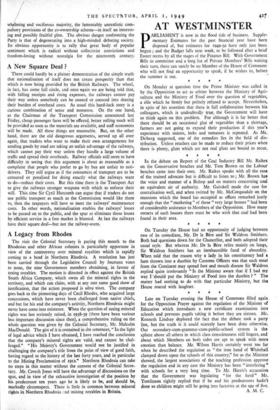A New Square Deal ?
There could hardly be a plainer demonstration of the simple truth that nationalisation of itself does not create prosperity than that which is now being provided by the British Railways. The wheel, in fact, has come full circle, and once again we are being told that, with falling receipts and rising expenses, the railways cannot pay their way unless somebody can be coaxed or coerced into sharing their burden of overhead costs. As usual this hard-luck story is a curious combination of sense and nonsense. On the one hand, as the Chairman of the Transport Commission announced last Friday, cheap passenger fares will be offered, better rolling stock will be provided as soon as the materials are available, and staff economies will be made. All these things are reasonable. But, on the other hand, there are the old dangerous arguments, served up all over again, that traders who want to make their own arrangements for sending goods by road are taking an unfair advantage of the railways, which cannot pay their way unless they handle a large volume of traffic and spread their overheads. Railway officials still seem to have difficulty in seeing that this argument is about as reasonable as a complaint that people who prefer to go by bus are unfair to taxi- drivers. They still argue as if the consumers of transport are to be censured or penalised for doing exactly what the railways want to do—reduce their costs. But this time there is the Transport Act to give the railways stronger weapons with which to enforce their will. This time Sir Cyril Hurcomb can argue that if traders do not use public transport as much as the Commission would like them to, then the taxpayers. will have to meet the railways' maintenance costs. In other words, nationalisation enables the railways' losses to be passed on to the public, and the spur to eliminate those losses by efficient service in a free market is blunted. At last the railways have their square deal—but not the railway-users.






































 Previous page
Previous page